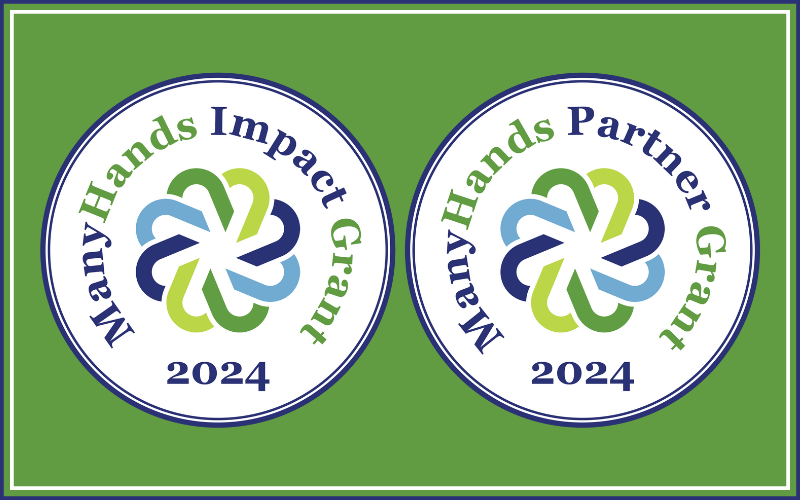We are delighted to announce that Many Hands members have selected SafeSpot Children’s Advocacy Center of Fairfax County to receive the 2024 $100,000 Impact Grant. Community Bridges Inc., Healthy Babies Project, Inc., and Together We Bake will receive Partner Grants of $69,000 each.
We are grateful to all the organizations that submitted applications this year and to all the members and friends whose gifts of time, talent, and treasure make our grantmaking possible. Together we make a difference!
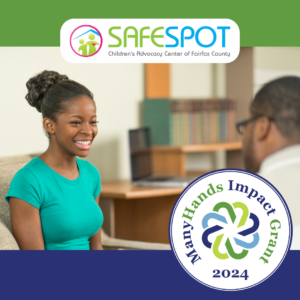 In 2013, SafeSpot Children’s Advocacy Center of Fairfax County was established by a group of concerned citizens who understood the need for a coordinated response to investigating and prosecuting child abuse, while providing comprehensive support services to young survivors. SafeSpot’s mission then and now is to provide a child-friendly, culturally sensitive environment that promotes the safety and well-being of children and families impacted by the tragedy of sexual and severe physical abuse in Fairfax County.
In 2013, SafeSpot Children’s Advocacy Center of Fairfax County was established by a group of concerned citizens who understood the need for a coordinated response to investigating and prosecuting child abuse, while providing comprehensive support services to young survivors. SafeSpot’s mission then and now is to provide a child-friendly, culturally sensitive environment that promotes the safety and well-being of children and families impacted by the tragedy of sexual and severe physical abuse in Fairfax County.
Child abuse is a significant public health problem, one that has short- and long-term consequences for children, families, and communities. According to the Centers for Disease Control and Prevention, about one in four girls and one in 13 boys will experience sexual abuse before the age of 18. Fairfax County, home to more than 330,000 children, receives more than 1,000 reports of child abuse each month through the Child Protective Services Hotline.
Before the development of Children’s Advocacy Centers, children who disclosed abuse would go from place to place to be interviewed and examined and to receive care, forcing the children to repeat their story over and over again to different professionals, causing further trauma as they re-lived their experience. As a Children’s Advocacy Center, SafeSpot centralizes this process in order to provide compassionate care while improving prosecution outcomes.
SafeSpot’s services include forensic interviews conducted in a neutral, fact-finding manner and coordinated to avoid duplicate interviewing; crisis intervention and support for non-offending family members; mental health therapy for children and caregivers; and careful case reviews by a multidisciplinary team of professionals, including law enforcement, prosecutors, interviewers, social workers, medical and mental health professionals, victim assistance staff, and child advocates.
By coordinating the Fairfax County response to child abuse, SafeSpot puts the interests of the child first.
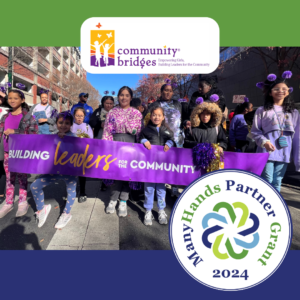 Community Bridges, Inc. empowers girls from diverse backgrounds to become exceptional students, positive leaders, and healthy young women by addressing the developmental needs of immigrant and minority girls and their families living at or below the federal poverty level. The school-based Girls Program encourages girls in grades 3-12 to explore their identity, increase their self-esteem, and build their character in a safe and nurturing space. The College Access and Success Program prepares high school students to enroll and succeed in college. Additional programs provide mentoring, support families and alumnae, and work to create systems change that will ensure a pathway to success for students with learning differences. Currently Community Bridges serves more than 550 girls from 21 Montgomery County Schools and over 2,000 family members.
Community Bridges, Inc. empowers girls from diverse backgrounds to become exceptional students, positive leaders, and healthy young women by addressing the developmental needs of immigrant and minority girls and their families living at or below the federal poverty level. The school-based Girls Program encourages girls in grades 3-12 to explore their identity, increase their self-esteem, and build their character in a safe and nurturing space. The College Access and Success Program prepares high school students to enroll and succeed in college. Additional programs provide mentoring, support families and alumnae, and work to create systems change that will ensure a pathway to success for students with learning differences. Currently Community Bridges serves more than 550 girls from 21 Montgomery County Schools and over 2,000 family members.
The 2010 census revealed that immigrant families constitute almost one-third of Montgomery County’s population and almost 40% of poor residents. The gender-specific challenges that girls in low-income immigrant families face are often exacerbated by limited English proficiency, the risk of family separation, and the challenges of bridging ethnic and immigrant cultures with the American school experience. CB employs a culturally responsive and intergenerational approach to meet their needs.
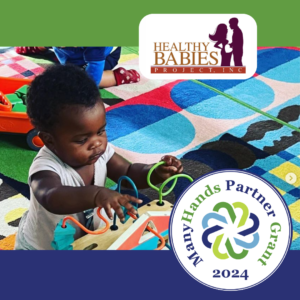 Healthy Babies Project, Inc. (HBP) empowers District of Columbia youth to build healthy, stable lives. HBP offers life skills training to vulnerable youth to prevent youth pregnancy; provides homeless and transient pregnant/parenting youth with evidence-based, one-on-one case management and peer support so they can build healthy families; and empowers youth with job readiness and advocacy training so they can move out of poverty. HBP also provides short-term crisis housing for pregnant and parenting youth as they work toward the goals of healthy birth outcomes and independent living or family reunification. In 2024, HBP plans to renovate and reopen a longer-term site that will offer young mothers and their children housing and wraparound services for 12-24 months.
Healthy Babies Project, Inc. (HBP) empowers District of Columbia youth to build healthy, stable lives. HBP offers life skills training to vulnerable youth to prevent youth pregnancy; provides homeless and transient pregnant/parenting youth with evidence-based, one-on-one case management and peer support so they can build healthy families; and empowers youth with job readiness and advocacy training so they can move out of poverty. HBP also provides short-term crisis housing for pregnant and parenting youth as they work toward the goals of healthy birth outcomes and independent living or family reunification. In 2024, HBP plans to renovate and reopen a longer-term site that will offer young mothers and their children housing and wraparound services for 12-24 months.
Each year HBP serves 200 youth (pregnant, parenting, and non-parenting), plus babies, primarily in Wards 5, 7, and 8. In 2022, 62.5% of the case-managed youth were in unstable/transitional housing, in foster care, or transient/homeless upon intake. Among case-managed youth, the number of those in stable housing tripled within a year of intake and 96% created and implemented a job readiness plan. HBP mothers have experienced zero infant mortalities in the last three years, 86% of HBP births were at normal birth weight, and less than 1% of HBP mothers have experienced repeat, unplanned pregnancy in the 12 months after program completion.
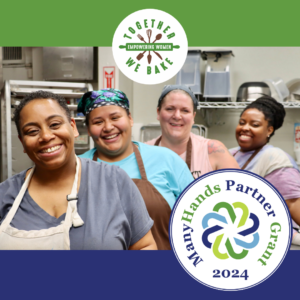 Together We Bake (TWB) provides a comprehensive workforce training and personal development program to help underserved women gain self-confidence, transferable workforce skills, and hands-on experience, which will allow them to find sustainable employment and move toward self-sufficiency. The program is centered around a small baking business through which women participate in food production, food safety education, and business administration. It includes empowerment and life skills classes to help women develop self-confidence, healthy coping strategies, and a strong support network. Each woman graduates with a nationally recognized ServSafe certificate, resulting in preferential hiring and higher wages. Based in Alexandria, TWB serves women across the region.
Together We Bake (TWB) provides a comprehensive workforce training and personal development program to help underserved women gain self-confidence, transferable workforce skills, and hands-on experience, which will allow them to find sustainable employment and move toward self-sufficiency. The program is centered around a small baking business through which women participate in food production, food safety education, and business administration. It includes empowerment and life skills classes to help women develop self-confidence, healthy coping strategies, and a strong support network. Each woman graduates with a nationally recognized ServSafe certificate, resulting in preferential hiring and higher wages. Based in Alexandria, TWB serves women across the region.
TWB focuses on women facing significant barriers to employment, including experience with domestic violence, homelessness, justice system involvement, and disability. Women attend an eight-week training program at TWB and continue to receive support after graduating from volunteer job counselors and staff. More than 270 women have graduated from the program since its inception, and despite the barriers they face, 70% are employed.


